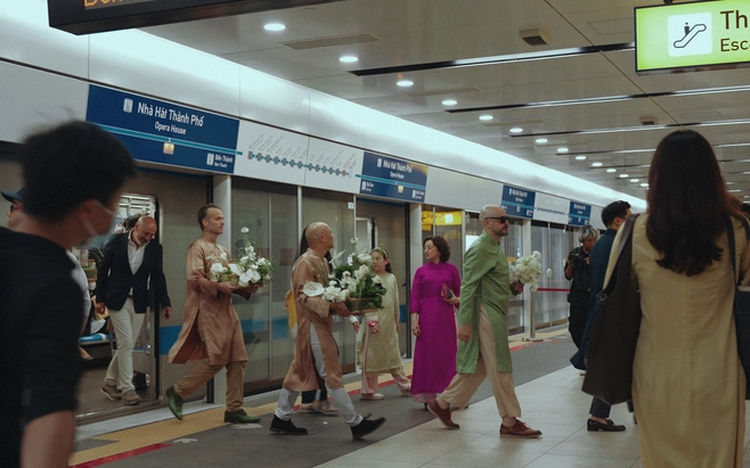
The Spanish groom and his family members disembark a metro train in Ho Chi Minh City to reach the bride’s family home for the wedding procession. Photo: The M.O.B Media
Tran Thi Bich Tra, born in 1988, residing in Thao Dien Ward, Thu Duc City, a district-level administrative unit under Ho Chi Minh City, said that on April 12, her husband, Manu Menendez, used the metro and a double-decker bus to go to her parents' house to bring her home as part of their wedding celebration.
The wedding procession included 15 people traveling from the Thao Dien metro station in Thu Duc to the Opera House station in District 1.
From there, they boarded a double-decker bus to Truong Son Street in Tan Binh District, where the bride's family home is located.
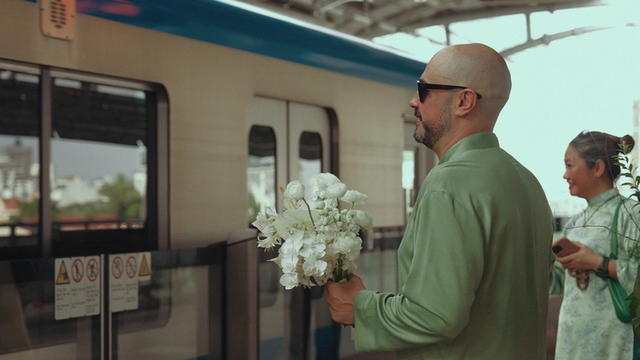
The groom is excited before boarding the metro train in Ho Chi Minh City. Photo: The M.O.B Media
Tra shared that she and Menendez had already held a wedding ceremony in Spain last year. They wanted to host an additional celebration in Vietnam this year.
“Many of my husband’s family and friends had never been to Vietnam, so we wanted to blend tradition with modernity to give them a joyful experience,” Tra said.
The idea of using the metro for the wedding procession was come up with by Tra’s younger brother, Tran Hung, born in 1993.
Hung explained that when his sister presented her desire, he immediately suggested using the metro.
“I’ve organized many wedding processions using Cub motorcycles and cycle rickshaws before," he said.
"For my sister’s wedding, our family initially said it could be done the usual way.
"But I know the Spanish culture is different.
"They prefer to move together, sing, and dance as a group instead of traveling on many vehicles.
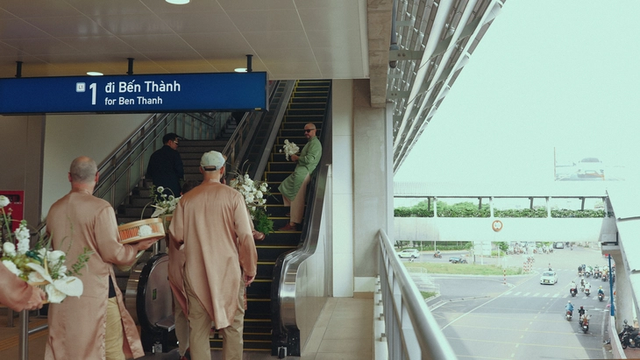
The wedding procession draws passers-by’s attention. Photo: The M.O.B Media
“Suddenly, I remembered that Ho Chi Minh City now has a metro line and double-decker buses.
"This would be perfect as the plan combined the culture of both countries and bridged the old and the new.
"When I proposed the idea, the couple immediately agreed."
According to Hung, the biggest challenge was timing everything precisely. The metro doors open for only about 20 seconds. Moreover, since the event took place on Saturday, a busy day, planning had to be very meticulous.
They made several trial runs to check how long it would take to travel from Thao Dien to the Opera House station and planned the route accordingly.
“We surveyed the route two to three times and asked for permission from the metro management board. At first, they were hesitant because recently there have been many young people filming on metro trains. But when they heard it was for a wedding, they were surprised and fully supportive,” Hung added.
On the wedding day, the organizers constantly reminded the group about when to get ready to “make it through the doors.”
As soon as the doors opened, the group had to move quickly because missing even one person would disrupt the entire plan.
“Security guards and attendants were incredibly kind and guided us carefully," Hung recalled.
"On the train, many passengers were curious and asked why we were wearing traditional Vietnamese ao dai.
"When they heard we were a wedding procession, they all reacted with excitement."
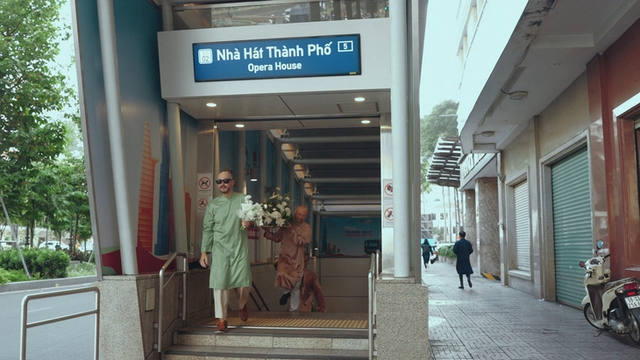
The impressive wedding procession is going viral on social media. Photo: The M.O.B Media
Afterward, the group boarded a double-decker bus waiting at the Ba Son station and traveled through various streets in Ho Chi Minh City, including Hai Ba Trung and Nguyen Van Troi.
On board, everyone toasted with beer, sang, and danced to celebrate Menendez’s big day. Many people on the street waved to the group as they passed by.
After the lunch party at the bride’s home, guests from both families boarded the double-decker bus again to return to the groom’s house in Thao Dien.
Tra said all the guests were thrilled and kept talking about the unforgettable experience.
They were so charmed by Vietnam that many brought back ao dai and gifts for their families. Menendez could not stop smiling.
“He said he had seen people using wedding cars before, but the metro gave a whole new experience," Tra recalled.
"It felt like a breath of fresh air for the city, showcasing its modernity and sophistication.
“People usually think many cars are needed for a wedding procession, but the metro is fast, clean, and convenient."
The wedding ceremony featured three languages: Vietnamese, English, and Spanish.
It took two months to prepare. The couple was overjoyed to see their wedding video going viral on social media.
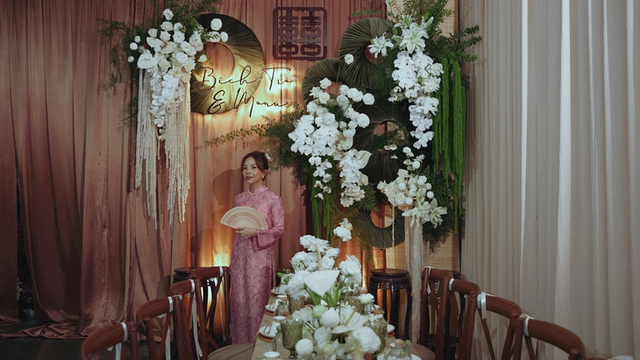
Watching the livestream of the wedding procession from home, the bride feels a deep sense of regret for not being able to join it. Photo: The M.O.B Media
“We met, got to know each other, and fell in love in Vietnam, so we always wanted to celebrate the wedding here in a traditional Vietnamese way," Tra said.
"Manu sees Vietnam as his second home. His family was really impressed with Vietnamese wedding traditions, which made me tremendously happy."
Tra and Menendez have been together for three years. Living in the same Thao Dien neighborhood, they matched on a dating app.
Upon meeting, Tra was surprised at how many interests they shared—travel, food, and compatible conversations.
They kept getting to know each other, which led to their dream wedding.
Tra said this unique wedding procession will always be a cherished memory for them.
Ho Chi Minh City's first metro line began commercial operations on December 22, 2024 and was officially inaugurated on March 9, 2025 after 12 years of construction.
The metro line was listed as one of the world’s 100 greatest places in 2025 by U.S.-based TIME magazine


Max: 1500 characters
There are no comments yet. Be the first to comment.